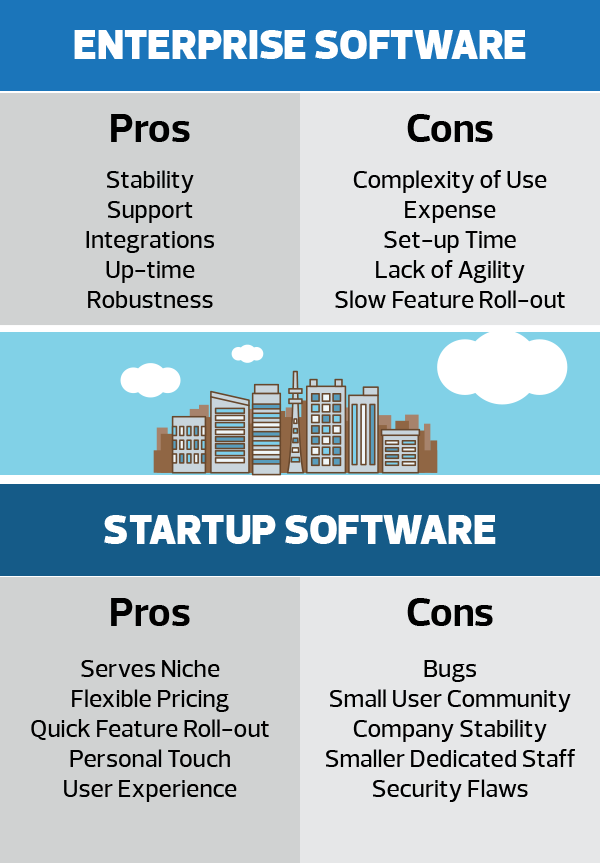Estimated reading time: 3 minutes

First off, I feel the need to defend my posts’ title. Before anyone can beat me to the punch let me point out that ‘startup’ software can in fact be focused on competing in the enterprise realm (think Box). The differentiation I’m trying to make is between the: Oracle, Microsoft and Adobe’s of the world vs. companies like Automattic (creators of WordPress) or Hootsuite.
In my job as a digital marketer, I do a lot of software evaluation. I enjoy it quite a bit and over the course of my time at BlueStar I have been involved with purchasing and rolling-out several pieces of software, both big and small.
Many of our enterprise software solutions (such as Outlook for email or Oracle CRM) are evaluated, purchased and implemented by IT. Others (like our web content management system) are decided upon collaboratively as they have major stakeholders spread across a number of departments.
Some of different types of software applications I have researched and evaluated:
- Web Content Management Systems
(WordPress, Typo3, Expression Engine, Drupal) - E-commerce Systems
(Big Commerce, Magento) - Email Marketing
(MailChimp, Constant Contact, Exact Target, Kapost) - WordPress Themes/Plugins
(too numerous to name!) - Project Management Applications
(Basecamp, Roadmap, Eloqua, ProofHQ) - Social /Analytics Tools
(CoSchedule, Hootsuite, Buffer, Oktopost, Flickr, SurveyGizmo) - Design Tools
(Adobe Creative Suite, Final Cut Pro) - Digital Signage Content Creators
(Zoomph, Flypaper, Tagboard) - Productivity
(Evernote, Wunderlist, Dropbox, Hightail)
Some important things to consider when evaluating software:
- What is my budget for this software acquisition? What is the pricing structure?
- How many users need access and where are they located?
- What are the implications of down time (both short-term and prolonged)
- Is the application cloud-based, installed locally or both?
- Will this application contain sensitive data? If so, what are my security requirements?
- Do remote or mobile users need access?
- Does the tool require internet connectivity?

When to Go With Startup Software
I’m a big fan of the little guys for tasks that are handled by smaller groups and that fill niche needs that are typically less critical than those we pair with larger enterprise applications. Many startup products change direction or add/remove features quickly, which can be a blessing and a curse. They’re often responsive and eager to delight their user base, but this is sometimes at the expense of quality control, which can lead to bugs and broken features.
I have had both very good and very bad experiences with startup software applications. I would suggest heavily that you seek legitimate user feedback/review. One of the nice things about working with startup companies is that you can often gain access to key people in the company such as founders and lead developers. Make sure to question them about how long they’ve been in business and what their product roadmap is. Hopefully after a thorough vetting you’ll have a better idea if you are willing to take a small risk on the company and their product.
Trial periods are also highly recommended. Many startups will accommodate serious prospects even if they don’t advertise a trial period. Lastly, don’t hesitate to make suggestions while trying out a startup product. Your feedback could be critical to their future success.
When to Go With Enterprise Software
When it comes to mission-critical business applications that just have to work, it feels warm and fuzzy to know you have a product with a large, well-funded backbone that isn’t going anywhere. It’s nice to have the option to pay a little extra for premium support, and it’s nice to know that no new features are going to roll-out without thorough testing.
One large consideration I haven’t mentioned to this point is the size of your business and the amount of user traffic or bandwidth a particular application needs to support. For instance, a small-to-medium sized company could probably consider a less-than enterprise web CMS solution if they have solid server infrastructure and relatively modest site traffic.
Overall strategy
My advice is to approach building your arsenal of software similarly to a stock portfolio. Diversify and experiment with some low-risk sure shots and some medium-risk but high-reward newcomers. You’ll be spending good money and need real results; so do your homework.
I’d be happy to answer any questions or share my experience with any of the software types I have mentioned above. As always, thanks for reading.

